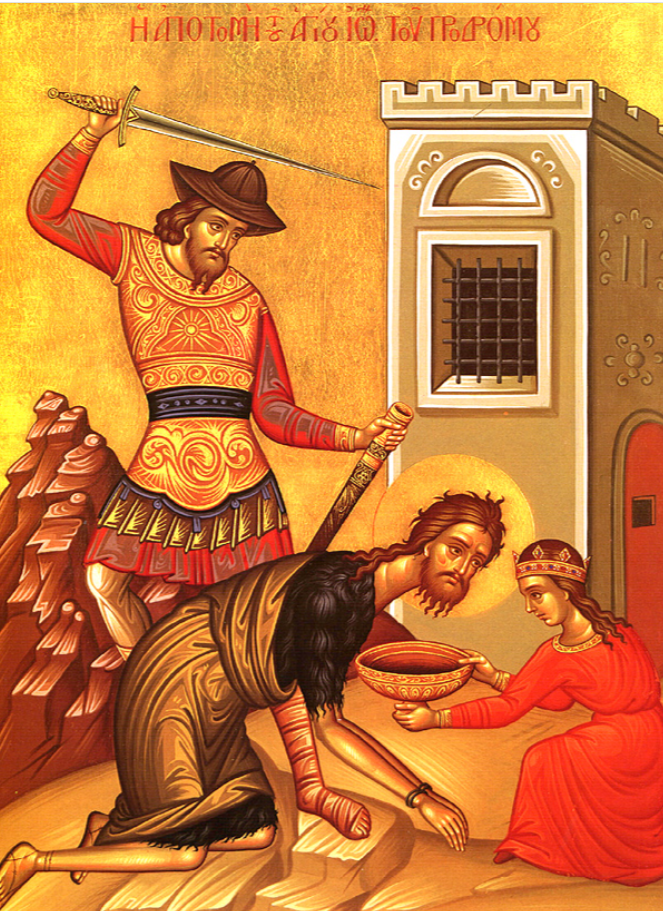The divine Baptist, the Prophet born of a Prophet, the seal of all the Prophets and the beginning of the Apostles, the mediator between the Old and New Covenants, the voice of one crying in the wilderness, and the God-sent Messenger of the incarnate Messiah, was the forerunner of Christ’s coming into the world (Isaiah 40:3; Mal. 3:1). He was conceived and born through many miracles, filled with the Holy Spirit even while in his mother’s womb, and lived a life akin to that of Elias the Zealot. His life in the wilderness and divine zeal for God’s Law mirrored that of Elias.
After preaching the baptism of repentance according to God’s command, John taught both common people and leaders how to live righteous lives. He admonished those he baptized, instilling in them the fear of God and teaching that no one could escape the coming wrath without performing works worthy of repentance. His preaching prepared their hearts to receive the Savior’s teachings. Ultimately, John pointed out Jesus as the Savior, saying, “Behold the Lamb of God, which taketh away the sin of the world” (Luke 3:2-18; John 1:29-36). Having spoken these truths, John sealed his testimony with his own blood, becoming a sacred martyr for the divine Law.
Herod Antipas, the Tetrarch of Galilee and son of Herod the Great, was responsible for John’s martyrdom. Herod had a lawful wife, the daughter of Arethas (or Aretas), King of Arabia Petraea, which had Petra as its capital (this Aretas is mentioned by Saint Paul in II Cor. 11:32). Without cause and in defiance of the Law, Herod divorced her and married Herodias, the wife of his deceased brother Philip. Herodias had borne a daughter, Salome, from her previous marriage.
Despite John’s condemnation of this unlawful marriage—telling Herod, “It is not lawful for thee to have thy brother’s wife” (Mark 6:18)—Herod did not desist from his sinful union. Instead, he imprisoned John, though he initially feared harming him due to John’s profound respect among the people.
However, driven by his lust for Herodias, Herod finally acted against his own initial reverence for John. On his birthday, during a feast, Salome danced to please Herod and his guests. Herod, in a moment of foolishness, promised her anything she wished, even up to half of his kingdom. Upon consulting her mother, Salome requested the head of John the Baptist on a platter.
Despite knowing the promise was unlawful, Herod, preferring his oath over the Law, complied. He presented the Prophet’s head as a reward for Salome’s dance, thus desecrating the sacred and venerable head. The body of John the Baptist was later taken by his disciples and placed in a tomb (Mark 6:21-29). The commemoration of his holy head is observed on February 24 and May 25.
Orthodox Christian Commemoration of the Beheading of John the Baptist
The commemoration of the beheading of John the Baptist is observed with the Divine Liturgy of Saint John Chrysostom which is conducted in the morning and preceded by a Matins (Orthros) service.
Scripture readings for the commemoration are the following: At the Matins: Matthew 14:1-13. At the Divine Liturgy: Acts 13:25-33; Mark 6:14-30. (If the feast falls on a Sunday the Gospel readings may vary.)
The day is also commemorated with a strict fast no matter what day of the week it may be.
Hymns of the Saint
Apolytikion (Second Tone)
The memory of the just is celebrated with hymns of praise, but the Lord’s testimony is sufficient for you, O Forerunner; for you have proved to be truly even more venerable than the Prophets, since you were granted to baptize in the running waters Him Whom they proclaimed. Wherefore, having contested for the truth, you rejoiced to announce the good tidings even to those in Hades: that God has appeared in the flesh, taking away the sin of the world and granting us great mercy.
Kontakion (Plagal of the First Tone)
The glorious beheading of the Forerunner was a certain divine dispensation, that the coming of the Savior might also be preached to those in Hades. Let Herodias lament, then, that she demanded a wicked murder; for she loved not the Law of God, nor eternal life, but one false and fleeting.
Source: GOARCH


